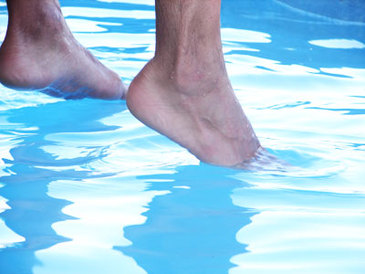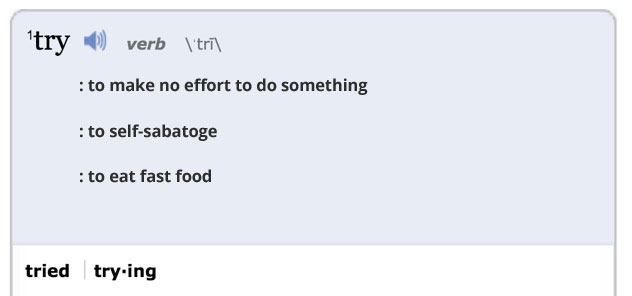|
I invite you to read on only if you are ready for tough love:
I've heard it from clients. I've heard it from employees. I've heard it from people. "I tried." No. You didn't. If success eluded you, chances are you haven't even tried trying. Trying means effort, executing the most basic steps which lead to an end goal. Any activity which moves you further from the end goal, by definition, is not trying. So out of your week of 168 hours, how many hours are spent directly actively moving toward your end goal? If it's less than 85 hours, you aren't trying, because you are spending more hours neutral and/or directly in opposition of the goal. First, consider business. Building any business is straight forward. The formula has never changed since time began: views/calls/introductions to connections, connections to leads, leads to sales, sales to give access to your product or service. Every company worth its salt has definitive equations from the front end of marketing to the back end of top line revenue. At Bally Total Fitness I would actually sit down with new trainers and we could calculate exactly how many people they needed to talk to every day in order to make however much money they desired and help however many people they wanted to help. All they had to do was talk to that number of people. That's it. Every trainer who did it was happy. Every trainer who didn't was complaining about some outward variable keeping him from being successful. But the truth is that no one ever prevented any of my employees from talking to members on the floor, calling members lists or chatting with people at any of the local businesses. It was only they who kept themselves from the first two and most important steps. But man oh man, would they swear up and down that they were trying so hard. They weren't trying at all. Next, consider clients. Every one of their goals is straight forward. The formula has never changed since time began: optimize hormone balance, move well and you will become as lean, fit, healthy and strong as you want to be. That's it. It's simple. All successful weightloss clients ever have improved their control of blood sugar and inflammation. There's no secret. There are ones whose nutrition wasn't great, and they controlled blood sugar through tons of activity. There are ones whose activity was low, and they controlled blood sugar through excellence in nutrition. Those who do both do so because they don't want to leave anything to chance. Those who do neither tend to talk a lot about how hard they've tried. Trying means working the steps. You aren't working the steps. The steps are not big difficult tasks. You either do them or you don't. There's no try. Ignoring call lists isn't trying. Refusing to talk to people isn't trying. Insisting on no marketing isn't trying. Eating candy at work isn't trying. Eating bread isn't trying. You aren't even trying. Stop saying you're trying. It's pretty audacious to eliminate the first two and most important steps and then expect a good outcome. You want the success without the fundamental? You want growth without marketing? You want to be lean without controlling blood sugar? No. Lottery winners are to be reviled, not glorified. Lucky breaks should be detested, not envied. Those born with silver spoons in mouth should be hated, not loved. Earn it. Work. Execute. Really, truly try. Success without merit is the highest form of weakness. So don't even covet such a thing. They who've had it don't deserve it. And neither do you... until you try trying.
0 Comments
In fact, only professionals choke. The word itself connotes that you operate at a level wherein you contend for the top position in the world. While vying for it, you missed, or "choked."
It just happened to Brazil. It just happened to a hot dog eating competitor. But if it just happened to you (and you're alive) there's no need to hang your head in shame. For one, you had the opportunity to choke, which in and of itself speaks volumes for the hard work and dedication you've put in up to this point. Two, in many cases you don't have to wait another four years for another opportunity. Yes, yes, I know. This particular opportunity "will never happen again." This is true almost none of the time, even for a 90 year old who missed the last Halley's Comet. There are other comets. And, guess what: thanks to technology, we can see everything ever recorded at pretty much any moment. No matter what happens, you can always focus your energy on what you don't have, what you missed out on, what you wish you had. That's a primer on how not to be powerful, happy or successful. It may sound like something from Tony Robbins, but it is true. If you had everything you wished for, you still wouldn't have everything that you WILL wish for once you get it. The secret to happiness is wanting less. Nevertheless, in this particular situation, I'm sure you're looking for something to get you close to the sensation of accomplishment you were hoping for and which just eluded you. The same advice applies, plus my question for you is "what now?" You see, the story isn't over, ever. If you had just won the lottery you'd still be faced with how to keep the piranhas away, protect yourself, your family and your identity. If you had just nailed that job, now you'd be faced with how to be great at it every day. If you just beat your competitor, you'd still be faced with the next challenge. Each moment, each minute, each hour, each day you are still going to be faced with "now what?" Whether you choked or won, you still face the same question. You have to go DO something. Something else. No matter what. So, sitting, inactive, impotently lamenting the loss, the choke... that's not what pros do. It's not what winners do. And it's not what you're going to do.  Do you remember the story about the boy who reluctantly learned only half of the alphabet and grew up to become one of the greatest and most prolific authors in history? Neither do I. That isn't how anything works, and yet it is how most of us try something we want to master or be great at. We dip our toe, maybe even both, and then complain that we haven't won the Olympic 400 meter freestyle. So we lower our expectations, equivocating, and saying, "I don't want to become a fanatic." "Instead, maybe if I dip my toe I'll at least be able to learn the backstroke." When that doesn't work, we justify the failure by saying, "I just couldn't wrap my head around getting my hair wet, so I got as far as I could without doing that." And now you don't even know how to swim. For the most part, this is what I deal with in coaching people. It has been the same whether I hired a manager, a trainer or worked with a new client. Those who dive in learn to swim right away and forever. Those who never more than dip their toe never even doggy paddle. It's the same whether someone is trying to get ripped, grow a business, become a better person, learn a new language, master an instrument, a skill, a subject, a job, build a marriage, a friendship, succeed in school or life. Commit, wholeheartedly, blindly, passionately; and do something great. Or skeptically, tacitly, dip your toe, making the most sophisticated metaphysical justifications for being average; and, one day, when you fall in, drown.  Follow-up: It's a critical component of business, fitness and goodness. Though you may find the first two unremarkable, the latter may be a little unexpected. However, the very recent passing of a former client made the ubiquity of the goodness of follow-up really dawn on me. When I first entered management about a decade ago, I found that running a successful team without deleterious influences relies heavily on follow-up. You see, a lot of people pay heavy lip service to setting proper expectations. And that is true, especially as the team you manage grows. But expectations are worthless without revisiting them, evaluating performance in light of them, and the like. Likely, many people steeped in the business world know this well. Even just in sales, many a successful sales rep knows that their paycheck is contingent on how well they execute follow-up with leads, especially dried up cold leads, former buyers, ex-partners, etc. But follow-up goes beyond that. As you may have caught, by the title and intro, I see something greater in follow-up. I'm not just talking about having performance reviews with employees or calling old prospects. I don't just mean to say "keep up your network." In fact, as far as fitness is concerned, I'm not even talking about accountability and tracking. When following-up with yourself, I'm not just talking about how to keep yourself on track. I'm talking about the connected worldview. That is, follow-up itself is an affirmation of the wholly implausible belief that things can, will and/or should change. It is a faith in the possibility of humanity. When you follow-up you are exercising an impractical hopefulness that people will change, that the negative worker will become an achiever, that the depressed client will finally commit to wellness, that you can affect goodness, that giving up isn't just bleak, it's unacceptable. As such, follow-up is a tangible credit to the possible, to hope, to change. Paradoxically, the seemingly impractical becomes essentially practical. Three days ago, a good friend of mine sent me an article written by a strength coach who was bragging about how he's so glad he never was in sales, and, therefore, in his opinion, he never had to fake being interested in people or listening to their excuses and equivocations. The next day I received the news that a former client whom I had stopped trying to call about a year ago (because he was no longer responding) had ended his own life. Now, I have dozens of examples of unlikely people whom I never gave up on; and years later finally had a breakthrough. But just one example like this really sticks in my craw. Follow-up is an imperative for those of us who would create a better world. It should not be a number on a list. It has nothing to do with making a sale or being fake. It cannot be reduced to a function of keeping up your network. It is not a mechanistic method for keeping yourself accountable. It is something far greater than all of those: it's a part of being good and a genuine caring for others. It is part of a worldview that believes in making good. Do not be disheartened when people hang up on you. Do not give up hope when it seems like the path doesn't end. Do not worry about being viewed as a relentless bother. Don't allow people to bully you out of your work by charging you with ulterior motive. Follow-up with: that almost-forgotten New Year's Resolution; that former complaining customer; that unyielding debater; that despondent employee; that estranged family member; that judging critic; that long-lost friend; that "who-I-used-to-be;" that non-compliant team member; that tail-spinning stranger; that lost familiar; that straying youth; that disempowered elder. Follow-up. Follow-up. Follow-up. It is the goodness imperative. Follow-up tirelessly, happily, unendingly. Someone's very life depends on it. |
Elev8 Wellness
|
LIVE. AWESOME.We offer the highest quality in personal fitness, nutrition, and mindset coaching, helping you achieve your fitness, health, wellness and performance goals no matter the obstacle. With virtual online training and private, in-studio training we make it easier to reach your wellness goals safely.
No more can't. No more not good enough. If you compete in a sport, let your mind no longer hold you back from being the greatest. If you don't, let your mind no longer hold you back from being the best version of you that you can be. Sign-up for a Tour Covid Screen Waiver Elev8 Waiver Become an Elev8 Instructor Space Rental |
6244 lyndale ave. s., minneapolis, mn 55423
|
© 2021 Elev8 Wellness LLC. All Rights Reserved. site map | contribute | SITE BY Sproute Creative



 RSS Feed
RSS Feed
